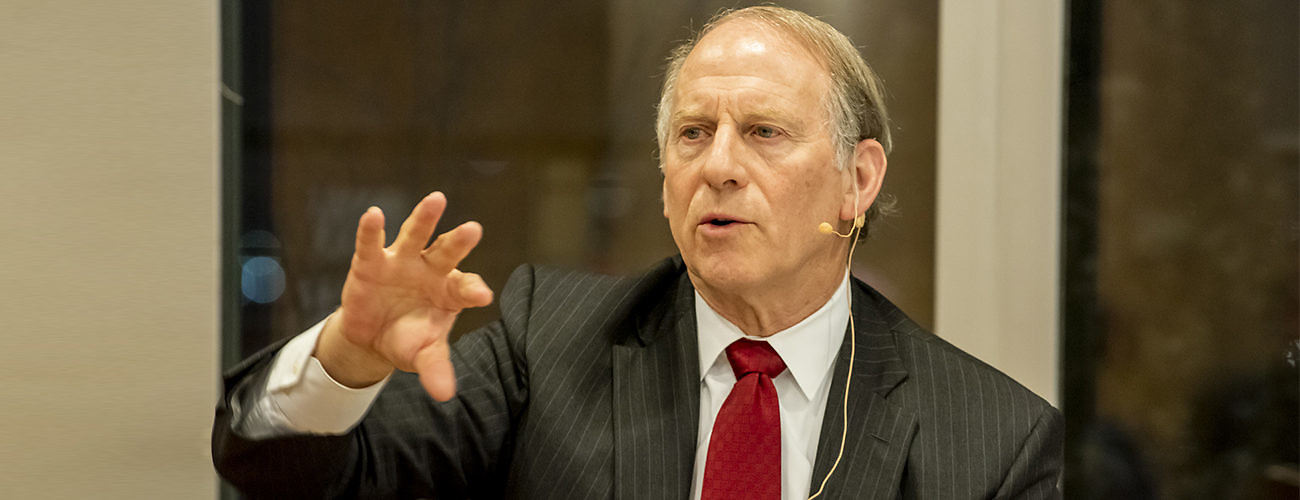We are not just witnessing a fraught moment in history, we are living it, with no clear outcome in view, Richard Haass, president of the Council on Foreign Relations, told attendees to a Distinguished Author Series event February 20th discussing his book A World in Disarray: American Foreign Policy and the Crisis of the Old Order.
“A lot of what we built up over the last 70 to 75 years it seems is in more than a little jeopardy,” he said. “Most of our lives we spend reading history, well for better or worse, this is a time now we’re living in history; people will look back on these years and say, ‘This is when the post-Cold War order essentially unraveled.’”
He added, “What I don’t know is exactly what’s the nature of that and what ultimately takes its place. There’s lots of scenarios where we can talk about what are the alternatives to the order we’ve known, but I do think that a big chunk of the order we’ve known has essentially run its course.”
In the conduct of international relations, he said, there was a new inward-looking focus on “burden sharing” rather than the more expansive and tolerant goal of “obligation sharing.” “What we are beginning to see around the world is a very different dynamic—much less emphasis on shared responsibilities, much less emphasis on human rights, democracy, and values, much less emphasis on institutions.”
He said that President Trump wasn’t so much the cause of this new dynamic but more a “reflection” of it. Politics and governance had not caught up with globalization, he said, and in the United States there was a reaction against “overreach”—a sense that America was doing too much abroad and not getting anything in return for it at home.
He said that in the one 15-minute conversation with candidate Donald Trump that he had during the 2016 campaign, Mr. Trump declared passionately that “America has gotten a raw deal out of trade and therefore trade is essentially a ‘rip off’, and secondly, America’s alliances and more broadly our global involvement cost a lot more than it benefited us, that essentially the game isn’t worth the gamble, that we’re being played for suckers.”
Mr. Haass disputed claims that Mr. Trump was an isolationist, saying instead that he was a “unilateralist” with a deep- seated distrust of international institutions like the World Trade Organization and the European Union and international agreements like the Iran nuclear deal, the migration compact, and the Paris accord on climate change.
He said that when Mr. Trump told him he liked his earlier book Foreign Policy Begins at Home, “I had to remind him that foreign policy begins at home, it doesn’t end at home.”
He asserted that the US was abdicating its position as world leader, but he didn’t see China stepping into that role. “To be a world leader, you have to have ambitions, certain capabilities, and you have to have followers. I don’t see China aspiring to that role. China is still using its foreign policy more than anything else to strengthen domestic policy.”
He said that world leadership could once be obtained by “coercion”, but no longer. “The United States turned out to be a very effective world leader because it was done with consent. The United States didn’t for the most part impose its leadership on others, but basically designed it, and others were pretty happy to participate. People were not forced to enter into alliance relationships, people were not forced to enter into certain institutions; they did so voluntarily.” In that connection, he said it was a “strategic and economic error” for Mr. Trump to pull the US out of the Trans-Pacific Partnership.
In general, he said he thought that American soft power had “taken a real hit” under President Trump but that it was recoverable. “What I think is more difficult to recover will be America’s reputation for reliability.”
In the post-Cold War era, most conflicts have been within states and not between them, but that was now changing, he said. “The possibility of interstate conflicts is much greater now than it’s probably been for decades,” he said.
He acknowledged that with the rise of unilateralism and nationalism, multilateralism was under attack, and its institutes “ossified”, but he encouraged its revivification. “You’ve got to form coalitions of the willing…if you can get a significant number of players that have real weight that’s meaningful, second of all, they become real laboratories.”
“I’m trying to get people to rethink multilateralism…we’ve got to design it in such a way that it is an extension of national self- interest,” he said. “I try to develop the notion where we need to see sovereignty through the prism of obligations as well as rights. In a web of reciprocal obligations, there would come about a world that would be better not just for the other guy but be better also for ourselves.”
As for the United Nations, Mr. Haass said it was never designed to be “an institution used by one major power against another…that’s why the five were given vetoes. So we shouldn’t be surprised that when they disagree the UN’s not effective.
“To me,” he concluded, “the real challenge for the UN is to focus on the parts of the UN that the UN controls, and that’s things like peacekeeping and the rest, and build up real capability that’s not corrupt, that doesn’t do violence to the people it’s meant to protect, particularly women and girls. Let’s improve that. Let’s improve the ability of the UN to deliver services, let’s do something about the spoils system, about the corruption, about the incompetence—that’s what the UN has real control over.”
The event was moderated by IPI Senior Adviser for External Relations Warren Hoge.








